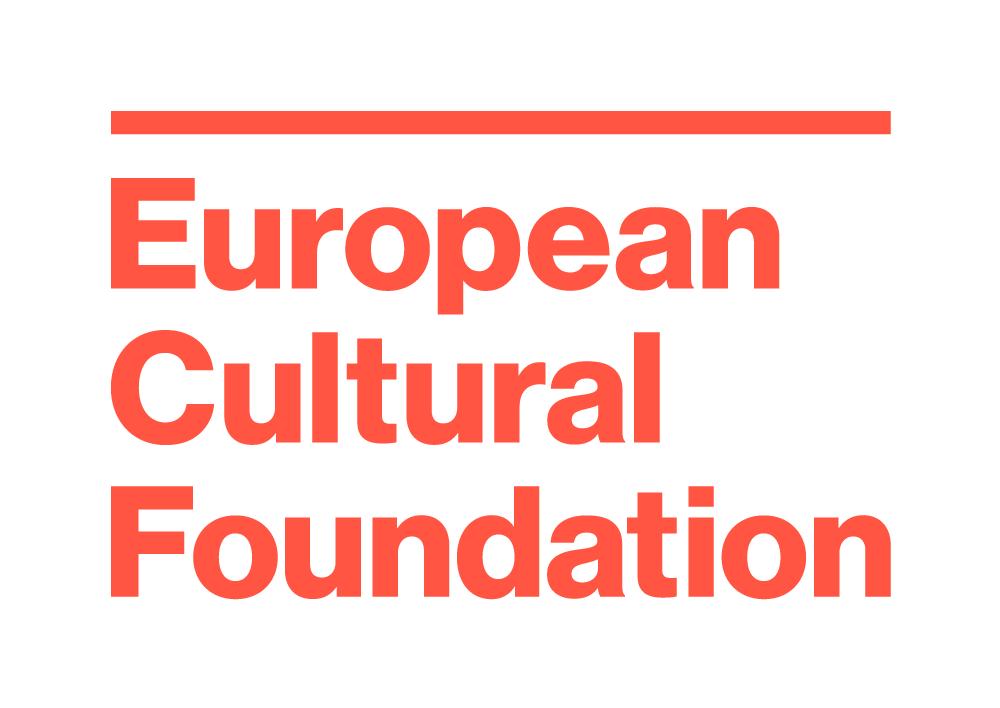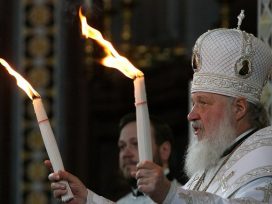The Orthodox Church is often said to be leading the anti-vax campaign in Greece. But in reality, the Church firmly supports government health policy. What, then, explains the prominence of Orthodox clergy in the protests?
Instead of being a time of unity and solidarity in Greece, the COVID-19 pandemic has proven to be a time of disunity, a time of deepening divisions after a decade of crisis. The public discourse on religion is part of this process of polarization. Some have speculated on the role of religion, and Orthodox Christianity in particular, in the success or lack thereof of pandemic-related policies in Greece. However, Greece’s story is more complex. When one takes into account Greek politics, Church-State relations and local schisms, a nuanced picture emerges of religion’s role in the pandemic.
Like in other countries, the Greek government has legitimized emergency measures by reassuring the public that it was ‘simply following the science’. In the Greek case this has been particularly extreme. Not only did the government feel the need to justify its every action or failure to act as having been dictated by ‘the scientists’, but it also framed every disagreement with government measures as originating in science-denying conspiracy theories. This political strategy negated the possibility of other ways to handle the crisis.
The rough equivalent in Greek to the term ‘tin foil hat enthusiasts’ is ‘the sprayed ones’ – alluding to the minuscule number of people who believe in the chem-trail conspiracy theory. Greece’s Prime Minister Kyriakos Mitsotakis referred to ‘the sprayed ones’ on 31 October 2020 to refer to those who criticise ‘scientists’. ‘Let us leave the scientists out of any controversy whatsoever,’ he said: ‘Legitimate political criticism is to be limited to politicians.’
To claim that any government follows ‘the Science’ in an apolitical way is of course disingenuous. Were there to be a singular ‘Science’ that governments adhere to by the letter, there would be no variations in the handling of the crisis among the ‘responsible countries’. But the fact is that Greece has been one of the strictest countries in the EU as far as COVID-19 measures are concerned.
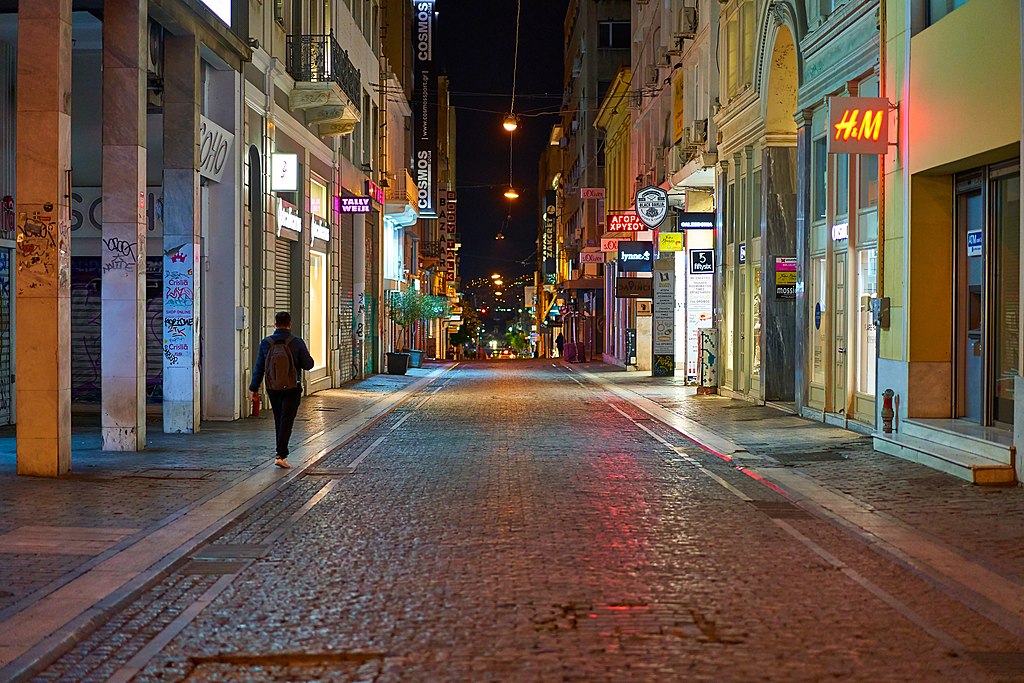
Athens shopping street Ermou deserted during Greece’s second lockdown in November 2020. Via Wikimedia Commons.
Addressing the parliament on the scarcity of ICU capacity in Greek hospitals in early December 2021, Mitsotakis claimed that the number of Intensive Care Units made no difference to the survival prospects of intubated COVID-19 patients in need of admission to an ICU. It later emerged that the office of the Greek prime minister had been notified in advance of a forthcoming study, published on 13 December 2021 in the Scandinavian Journal of Public Health, which provided proof of precisely the opposite. A prosecutor’s investigation has been ordered into the scandal.
The enforced and in this case genuinely misleading confluence of government decisions and science has acted to the detriment of popular confidence in scientific method. As Greece’s independent media platform The Press Project pointed out, ‘the hegemonic discourse’ on the ‘sprayed ones’ undermines the authority of scientific method in the name of the political game. In Greece, there is no two-dimensional spectrum between accepting or rejecting scientific evidence, but a political instrumentalisation of the authority of science and the problems, tensions and polarisations that this engenders.
Trapped in the Middle Ages?
The Orthodox Church of Greece has a perpetually ambiguous place within the Greek public sphere. On the one hand, Greece regularly ranks among the highest in the EU when it comes to ‘believing in God’, ‘trusting the Church as an institution’ and ‘deeming religion as important’. On the other hand, seven out of ten Greeks will readily reject statements such as ‘when science and religion disagree, religion is right’.
The flipside is that the Church’s prominence, impact, influence and power engenders frictions and discontent. For example, there has hardly been a time when demands of a France-style separation of Church and State have not been present in Greek public discourse. A significant part of the population firmly believes that every other western country has full Church-State separation, in which religion is hermetically banished from the public sphere, politics and business, while Greece remains permanently trapped in the Middle Ages.
Framing the question in such a way makes it virtually impossible to successfully propose a Greek Church-State separation based on European precedents, since it would never match up to French laïcité. The outcome is that nothing ever changes. The status quo is thus most successfully defended by those who purport to undermine it.
While looser than in Belgium, for example (where the government pays the salaries and pensions of the clergy of various confessions and religious buildings maintained by municipalities and provinces), Church-State ties in Greece are indeed close. Article 3 of the Greek constitution describes the Eastern Orthodoxy as ‘the prevailing religion in Greece’ and the salaries of a very sizable part of the clergy are paid by the state (although other types of direct financial assistance are not provided, in contrast to Germany, for example). The inauguration of a new parliamentary term is blessed by the Church in the parliament building and the religion taught at school is predominantly Orthodoxy.
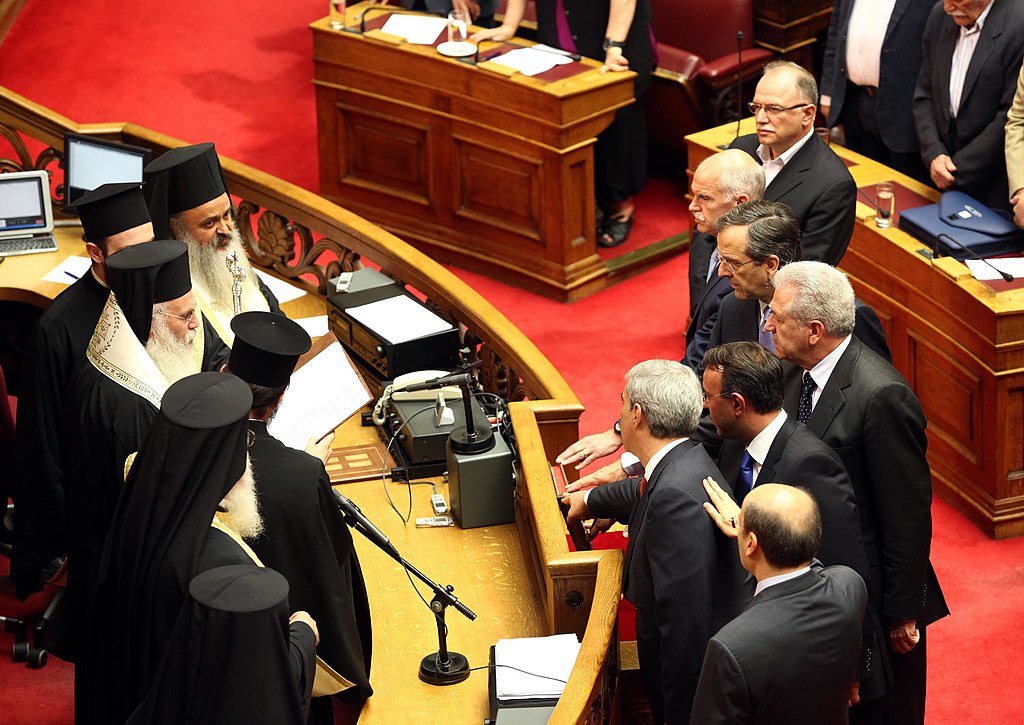
Swearing in of foreign minister Dimitris Avramopoulos in 2012. Photo via Wikimedia Commons.
It is therefore important to focus on the institutional church’s stance vis-à-vis the pandemic. Anecdotal evidence such as the pronouncements and activities of this or that cleric is of course to be taken into account. However, in assessing the stance of the Orthodox Church of Greece during the pandemic, one must look at the decisions, resolutions and statements of those with the authority to represent it: the Holy Synod of around eighty bishops, the more versatile, twelve-member ‘Permanent Holy Synod’, and the Archbishop of Greece, the chairman of the Synod.
Eucharist wars
On 28 February 2020, shortly after Greece recorded its first COVID-19 case, an encyclical of the Synod urged the faithful to follow state sources of information and the recommendations of scientists. It also asked the elderly and high-risk individuals to isolate and not attend church. In Mitsotakis’s address to the nation on 11 March, he said that he looked forward ‘to the support of Church leadership in the common cause’. But he went on to remark that ‘faith begins where science ends’, pushing the narrative that science is by definition in opposition to religious faith.
In the following months, the Church did not challenge the prohibition of services, as other western European Christian churches successfully did.1Ecumenical Patriarch Bartholomew noted that, as far as the pandemic was concerned, ‘it’s not the Faith that is in danger, but the faithful and their health’.
In another encyclical, the Synod lambasted COVID-19 sceptics who ‘scandalise the faithful with slander, fictions and insults’ by criticising protective health measures and their adherence by the Church. At the same time, the Synod clarified that its support of COVID-19 measures did not mean that it believed that partaking in the sacrament of the Eucharist might prove to be source of infection.
From the start of the pandemic, a sizable portion of the ‘Church and COVID-19’ debate centred on how the Orthodox Church administered the Eucharist, i.e. by a spoon shared by all. While temporarily changing the mode of administration for the Eucharist was discussed in the media, nothing altered.
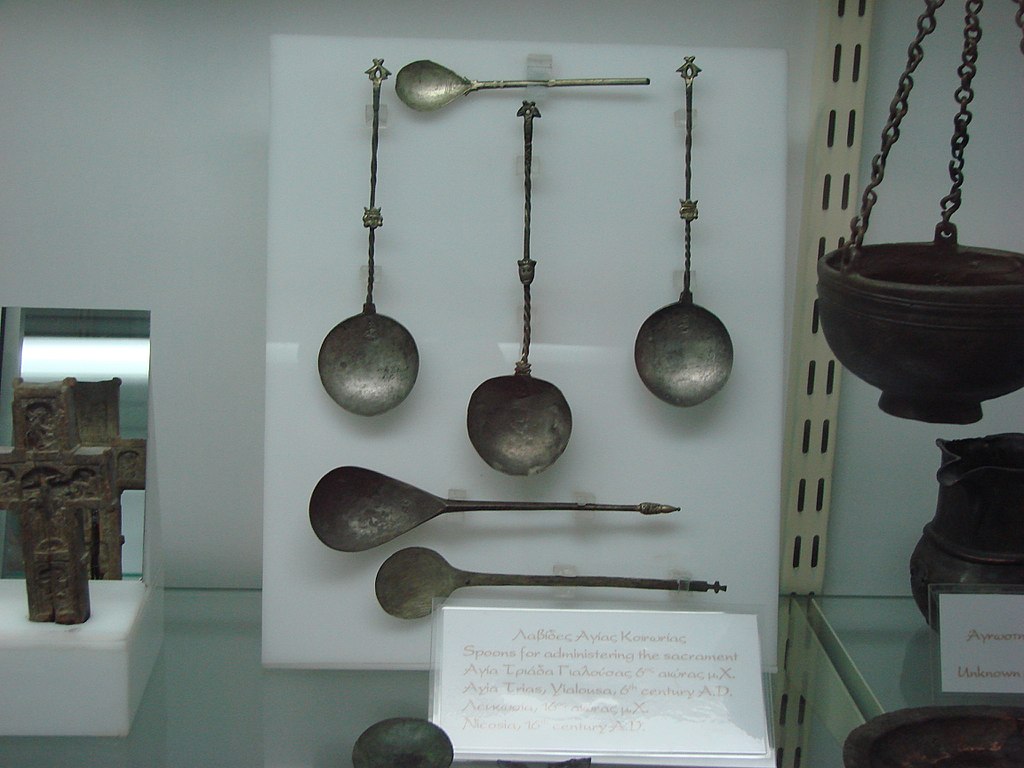
Medieval spoons used in the administration of the eucharist, Limassol Medieval Museum, Cyprus. Via Wikimedia Commons.
The immunologists Eleni Yamarellou and Athina Linou of the University of Athens claimed that there was no ‘definitive proof that the Eucharist can cause the spread of COVID-19’ and that ‘this was a matter of one’s personal faith’, igniting the ire of many in Greece’s public debate. Some isolated voices – including the Metropolitan bishop Kosmas of Aetolia and Acarnania, who later died of COVID-19 – claimed that the church building was, miraculously, a sanitised space.
The focus on the Eucharist missed the point, of course. Being in a crowded worship space, with or without masks and social distancing, necessarily entails a danger of infection. The question was rather whether the government or the Church was willing to do address this reality.
‘Eucharist wars’ aside, the celebration of Epiphany in 2021 remained the only real clash between the institutional church and the government. In the face of prolonged restrictions, the Synod announced that it would openly celebrate Epiphany with the faithful, albeit adhering to strict social distancing measures. This included the cancellation of traditional open-air ‘cross dives’ by seas, rivers and lakes. Epiphany was celebrated in the parishes instead.
In the following months, the Church of Greece supported the vaccination campaign, issuing a pamphlet with an extensive Q&A by doctors asserting the safety of vaccines. The pamphlet was distributed to all parishes of the Orthodox Church of Greece. It ended with the assertion that ‘vaccination is a supreme act of responsibility towards fellow human beings, while the vaccine against the coronavirus does not contradict in any way the hagiographic, paternal and canonical teaching of our Holy Church’.
Towards the end of 2021, Archbishop Ieronymos remarked once again that ‘the Holy Synod recognises the Greek government’s responsible stance in the struggle against the spread of coronavirus’, urging ‘everyone – clergy and laity – to be vaccinated’. In a joint press release, Mitsotakis congratulated the Church on its responsible approach in countering the pandemic.
A TV army of cassocks
As of 20 January 2022, Greece’s fully vaccinated amount to 67% of the population, just below the EU/EEA average of 69.4%. Despite occasional bumps in the road, the Orthodox Church has been one of the government’s strongest allies in securing a high acceptance rate for the government’s handling of the COVID-19 crisis and rolling out of the vaccination programme.
In many ways, more indirect than institutional, the Church can be seen as part of the state apparatus, a reality which the Greek state makes good use of. SYRIZA’s attempt to reform Church-State relations in 2018/19 was opposed by bishops, clergy and the faithful (although supported by the Archbishop). But with the reinstatement of the ancien regime in the form of Néa Dimokratía, calm has returned to Church-State relations.
Nevertheless, it is often reported that the Orthodox Church in Greece forms an impediment to countering COVID-19. In July 2021, for example, the news outlet Politico ran a piece describing Vasileios Voloudakis, one of Greece’s approximately 10 thousand low-ranking clerics, as ‘a prominent critic’ with ‘a lot of supporters’. However, there is no evidence to support this. Metropolitan bishop Seraphim of Kythera was referred to as ‘one of the country’s most powerful clerics’, but the article failed to mention that he was also one of the two bishops summoned by the Synod for disobeying its line on the government’s handling of the pandemic. This is simply sloppy reporting, in which the stance of the Orthodox Church of Greece is identified with voices on its fringes.
Another fact that often eludes observers is that Greece has a minority of disparate Old-Calendarist groups or ‘Genuine Orthodox Christians’. ‘Old-Calendarist’ does not entail merely the adherence to the ‘Old’, Julian calendar, which is the case for numerous canonical Orthodox churches, including the Russian Church. It also refers to the schism from the official Orthodox Church following its early-twentieth century adoption of the revised Julian calendar, in the context of Greece’s division between royalists and republicans.
While low in numbers and impact, Old-Calendarist groups are particularly active in conservative and ultra-conservative demonstrations on Greece’s streets and the internet. They featured heavily in protests against the Prespes Agreement on North Macedonia of 2018, for example. The vast majority of media reports featuring photos of clergy demonstrating against coronavirus restrictions or vaccines depict clerics that do not belong to the official Orthodox Church of Greece, sporting stereotypically Old-Calendarist attire. The involvement of fringe Old-Calendarist fanatics in the COVID-19 protests should not lead one to assume that they characterize or play a leading role in the protests, and even less that their position is equivalent to that of the Greek Orthodox Church.
This is not to say that there are no Orthodox clerics who publicly oppose coronavirus restrictions or COVID-19 vaccines, and who call upon their parishes to act accordingly. Opposition is often centred around monasteries, unsurprisingly given the nature of these establishments as places of withdrawal from the secular world. Here, a certain amount of friction with their local ecclesiastical authorities is often to be observed. However, this by no means indicates that a divide exists between the Synod and the rest of the Church – even if the metropolitan bishop of Dodoni went as far as to claim that ‘vaccine-denying and COVID-denying priests should be hanged’.
While it is extremely difficult to find reliable, quantifiable data on who does or says what, day-to-day observation suggests that the overwhelming majority of Athenian parishes adhere to state-imposed health measures to a tee, from social distancing to face masks and disinfecting agents. In a country of about 10,000 active parishes, cases of COVID-19-denying or anti-vaccine priests and parishes cannot but be numerous in absolute terms, most probably in proportion to the same tendencies among the general population.
In any case, these exceptions to the rule are exaggerated in Greece’s government-friendly media, finding an ally in voices on the left keen to identify an obscurantist ecclesiastical opponent to an Enlightened progressivist cause. ΣΚΑΪ TV news, for instance, frequently runs stories on ‘anti-vaccine priests spreading outrageous lies’, ‘COVID-denying priests in a battle against the vaccines’. By regularly watching the news, one might get the impression that a mass insurgency is underway spearheaded by hundreds of science-denying priests in COVID-infected cassocks. By visiting 50 or 100 random Athenian parishes, one gets a very different picture. Perspective is everything.
Schrödinger’s church?
Still, even a minority of dissenting priests is quite a substantial number. How is this to be explained, given that the Orthodox Church of Greece is usually thought to have a strict hierarchical structure?
The Church of Greece is not a ‘Schrödinger’s cat’: it cannot be at once tightly top-down and anything-goes. Conspiracy theories that claim the Church merely appears to defend government policy while actually intending to undermine it are not the answer. Instead, we need to take social class into account.
It would be an apolitical folly to think that the radical changes the pandemic has brought to social life, or the fact that vaccines developed at an unprecedented speed must be used to inoculate the entire population, would not engender dissenting voices in the population. We happily become polarised in much less challenging settings.

Anti-vax demonstration in central Athens, July 2021. Photo by Alessio Giussani.
In the case of the pandemic, dissenting citizens from the middle classes have a voice of their own in the public sphere. They require no collective or communal way to articulate dissent. However, this is not the case for the working class.
Apart from the political parties, there are only two kinds of institutional community where working-class people in Greece, and particularly in Greece’s provinces, can join their voices with the voices of others: football clubs and the local church.
All of Greece’s parliamentary parties support the COVID-19 vaccination programme (apart from the far-right ‘Greek Solution’, which tries to play it both ways). Football clubs – usually belonging to Greece’s oligarchs – can be political at times; but analysing coronavirus measures wasn’t quite their thing. Thus, the only communities where dissenting working class citizens – ranging from groups that suffer financially from COVID-19 restrictions to proper conspiracy theorists – could rally were the local churches and parishes where a priest of a similar opinion was willing to lead them and to take the microphone.
Perhaps this offers a preliminary explanation as to why clerics are particularly visible in the anti-COVID and anti-vaccine crowd, despite the official Church’s staunch defence of the government’s COVID-19 health measures and vaccination programme.
One day, the pandemic will be a thing of the past. Yet the divisions within Greek society sowed by the handling of the health crisis – on top of a decade of economic recession – will persevere. During the pandemic, Greece’s scientists and the Orthodox Church risked becoming servants of political power – ancillae potestatis – in the name of a common cause: public health. One way for Greeks to heal the divisions them would be to re-articulate certain fundamental values, including the freedom of the press, the integrity of scientific method, and the separation of Church and State. Or, more accurately in Greece’s case: the liberation of the Church from the claws of the state.
Examples include: France, Conseil d’État, 18 May 2020; Germany, Bundesverfassungsgericht, 29 April 2020; Belgium, Raad Van State / Afdeling Bestuursrechtspraak, 8 December 2020.
Published 7 February 2022
Original in English
First published by Eurozine
© Sotiris Mitralexis / Eurozine
PDF/PRINTIn collaboration with
In focal points
Newsletter
Subscribe to know what’s worth thinking about.
Related Articles
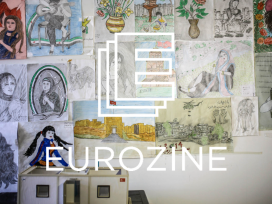
The coronavirus pandemic took the spotlight from the refugee crisis on the Greek border with Turkey in early March long before a political solution could be reached. Now, the two situations have merged into a poly-crisis.
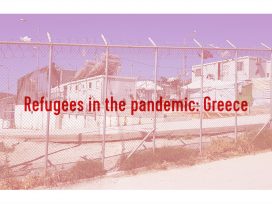
Politics of abandonment
Refugees on Greek islands during the coronavirus crisis
Social distancing is impossible when 1200 people share a single tap. The Greek government is using the pandemic to segregate refugees from citizens but hasn’t provided the means for prevention. If this politics of abandonment continues, grossly overcrowded camps will become death traps. The Eurozine miniseries reports from Greece.
